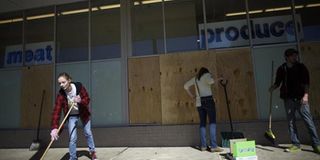Baltimore picks up the pieces after city rocked by riots

Julianna Lucas, 15, (left) joins a neighbourhood clean up crew outside a shop on April 28, 2015, the morning after citywide looting and riots in Baltimore, Maryland. PHOTO | MARK MAKELA |
What you need to know:
- Residents, shadowed by heavily-armed police, clean up after Monday's chaos.
- Some said it was no surprise protests turned violent in the city.
BALTIMORE
Baltimore resident Rashid Khan borrowed money from friends to open his grocery store two years ago — a going concern in one of the city's poorest neighbourhoods.
He lost it all in a flash, when violence engulfed parts of the city Monday as protesters, angry over the death of a young black man in police custody, set buildings and cars ablaze and ransacked shops.
"Inside is gone, they broke everything," he said, speaking in the scarred streets of west Baltimore on Tuesday, where hundreds of people, armed with rubber gloves and garbage bags, joined a clean-up effort amid heavy police presence.
Khan estimated the damage to his "King" grocery shop at $25,000 (Sh2.3 million). Nothing survived the destruction.
He doesn't have insurance, and doesn't know what he will do now.
"In one second, everything is gone," he told AFP near his store, where colleagues boarded up broken windows.
One of the panes on his corner shop was plastered with the words: "We must stop killing each other."
Freddie Gray died on April 19, a week after he was arrested by Baltimore police and somehow suffered severe spinal injuries.
Bystanders caught the arrest on video. Gray can be heard wailing in apparent pain as his limp body is dragged by police.
His death is the latest in a string of high profile confrontations between unarmed African-American men and US police to have sparked nationwide demonstrations.
'WE'RE NOT ANIMALS'
Protesters in Baltimore have staged nightly demonstrations since Gray's death, which descended into chaos on Monday following his funeral.
Officials set a 10pm curfew and schools were closed, as thousands of police and military reinforcements were ordered into the city.
Shadowed by heavily-armed police, residents cleared the streets, transformed into a battle zone just hours earlier.
"It just doesn't make sense to me that you would destroy your own neighbourhood, but right now I'm proud," said Cristal Renshaw, a radio promoter, down the street from a huge pharmacy that was set ablaze.
"I'm not proud of what happened last night but you see kids here with their parents and older people cleaning up. We're not animals, we didn't want this," Renshaw added.
Baltimore Mayor Stephanie Rawlings-Blake applauded the clean-up efforts, saying on Twitter: "I sincerely want to thank all those out there cleaning up streets and sharing their love for #OurCity."
Facebook groups were set up to aid the clean-up effort, urging people to bring garbage bags, gloves, brooms, dust pans and trash cans.
"I was coming out here to clean up because the world looks so abandoned," said 11-year-old Nireasha Kellum.
"I want to see it back the way it was before the riots started," said Kellum, who carried bags of trash with her mother and uncle.
Some said it was no surprise protests turned violent in the city, where tensions have long simmered between police and the public.
"I think it was justified because they were not listening to the normal protests," said lifelong Baltimore resident Pierre Estep.
"I'm not saying it was right but I understand the frustration of how it escalated," he added, recalling his own violent confrontation with police at 16 when an officer pointed a gun at him.
Renshaw said she understands that people are angry, but hopes to show the world a different side of Baltimore.
"Some people are mad, like 'eff the police.' I get it, you're mad. We're all entitled to be pissed off, but destroy it? The world is watching us right now," she said.
"Our community will get better I hope this woke everybody up."





